Overview
- Health studies mainly use human subjects.
- Honesty, trust, and respect guide researchers.
- The Belmont Report:
- –3 principles for ensuring ethical conduct.
- Respect for persons.
- Beneficence.
- Justice.
- –3 principles for ensuring ethical conduct.
- Any research that needs to improve human health will ultimately involve human subjects.
- The relationship between the researchers and research participants should rely on honesty, trust, and respect.
The Belmont Report
The report highlights three principles that are essential in upholding ethical standards in research involving human participants.
- Respect for persons.
- Beneficence.
- Justice.
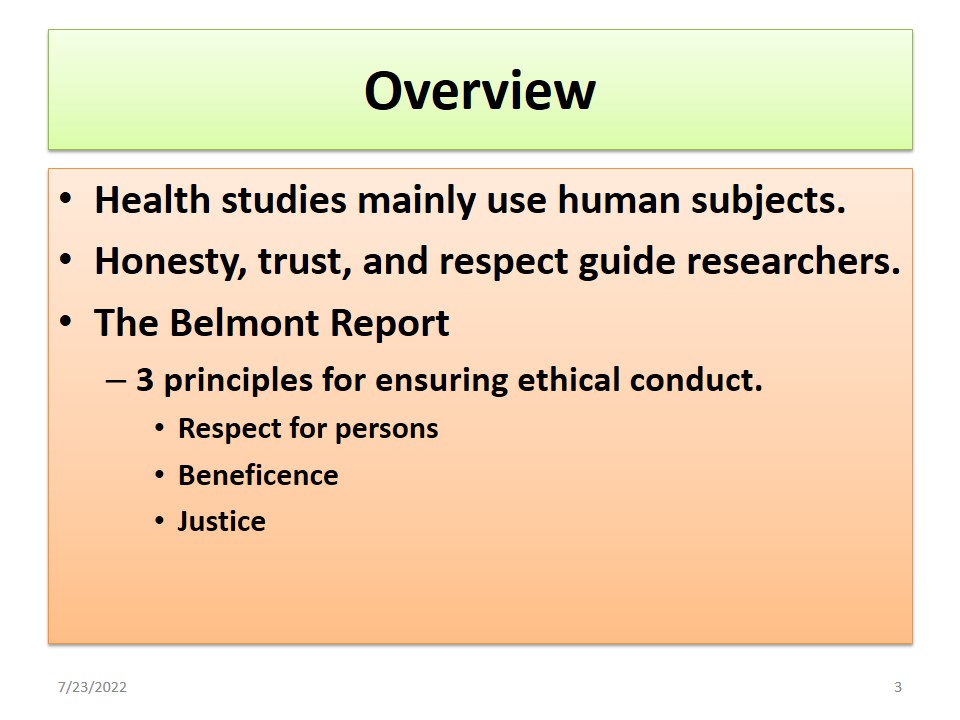
Respect for persons
All individuals in a study are autonomous:
- They understand the harms and benefits of participating (Finkelman & Kenner, 2010) Individuals with diminished autonomy deserve protection.
- children.
- people with severe developmental disorders.
- people with dementia.
Respect for persons:
- Participant must analyze the risks and benefits of participating in the study and then align them with personal goals and values.
- The participant should made the decision based on the analysis
- Being autonomous implies that one can consider the harms and benefits of a situation and decide whether to participate in the study
Diminished autonomy cases:
Individuals with diminished autonomy include children, people with severe developmental disorders, and people with dementia:
- With children, researchers must seek the permission of the parents.
- When assessing the ability give consent to a study, researchers will look at the participant’s capacity to participate, complexity, and risk of the study.
- In case of prisoners, agreeing to participate should not be used as a basis for undue influence with regard to qualification for parole.
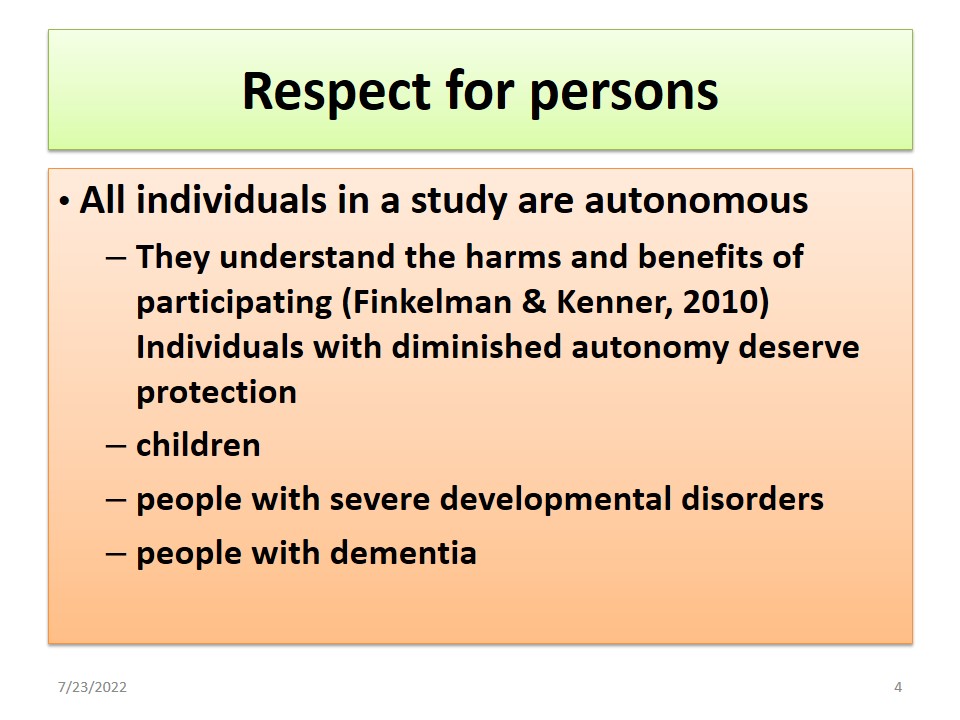
Beneficence
- Do no harm.
- Maximize the benefits and minimize the harms.
- Justify unavoidable risks.
- Debrief participants.
- Researcher must justify unavoidable risks. The anticipation is that research aids in the development of important generalizable knowledge.
- The researchers may debrief the participants at the end of the research to minimize harm.
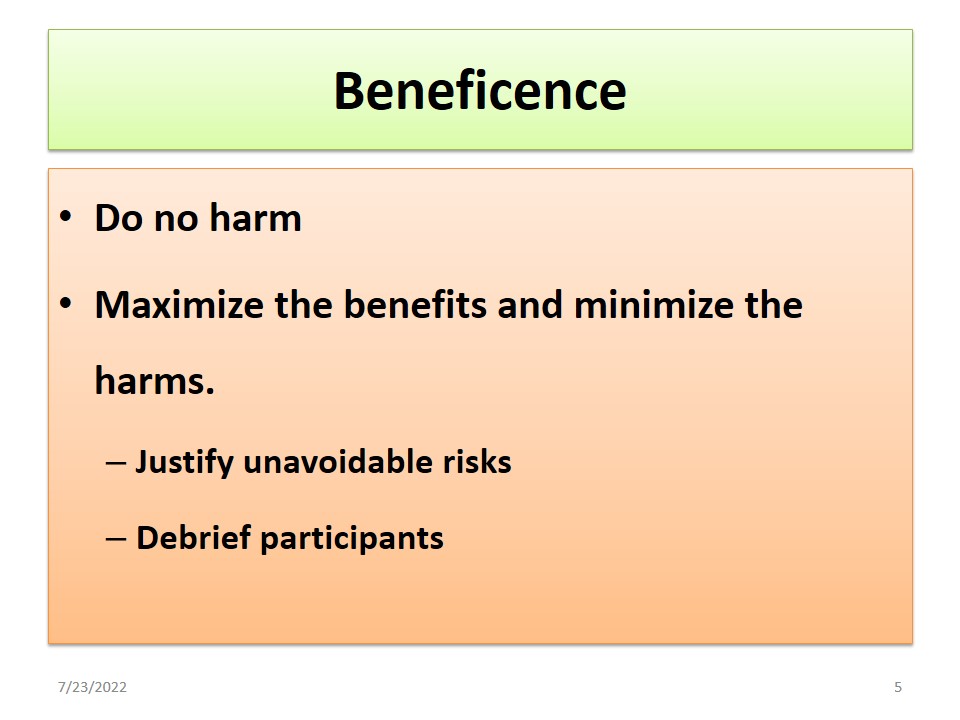
Justice
- Participants need equal treatment:
- Be aware of the benefits of the research;
- Burdens borne during the research.
- Fair selection of participants:
- Qualification requirements should not portray bias.
Participants need equal treatment with regard to bearing the burdens of the research, as well as enjoying its benefits.
Justice requires researchers to be fair in selecting participants. Social justice requires researchers to be fair when considering the social class and groups of people to be recruited and their qualification to participate in the research.
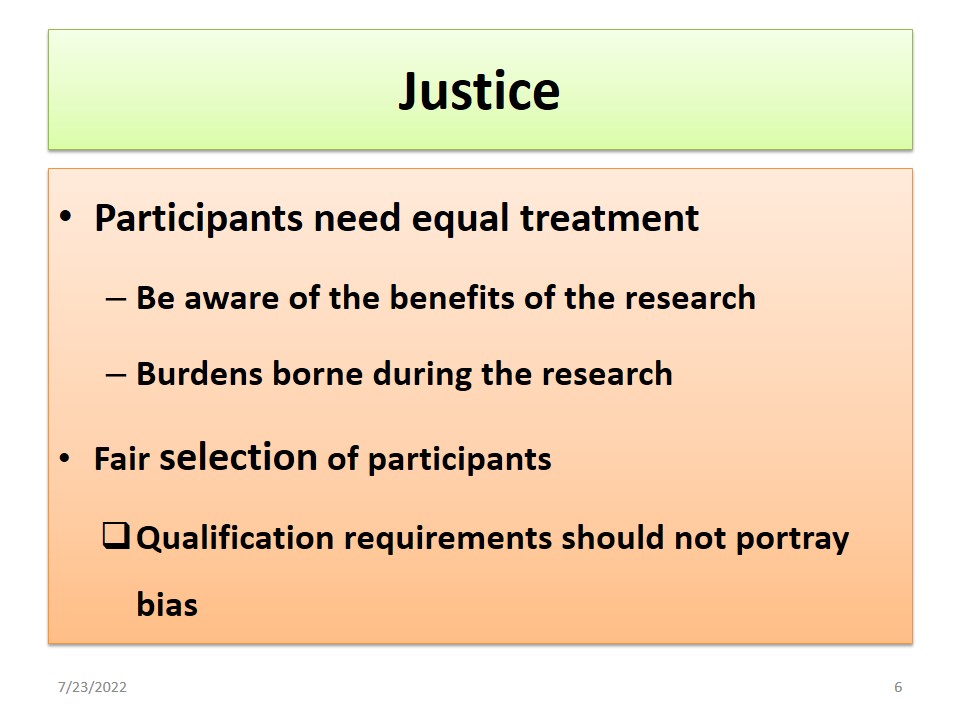
Challenges of following the guidelines
- Participants should comprehend all potential risks and benefits (Polit & Beck, 2013).
- Avoid influencing participants through:
- Coercion
- Undue influence
Coercion
Nurses and researchers have to ensure that all the participants comprehend all the potential risks and benefits of the research (Polit & Beck, 2013).
- Coercion relates to the act of influencing an individual’s decisions. The influencer uses threats or implied threats. For example, the coerced person could be threatened that they will lose a job, unless they do something as required by the influencer.
- Authority can cause indirect coercion
- Participants may fear the authority of the researcher and feel coerced to comply with the request to participate.
Undue influence
Undue influence occurs when participants get rewards or reward promises that are excessive, unwarranted, inappropriate, or improper, with the intention of making them comply with what the researchers want.
The problem with undue influence is that the subject receives an incentive to lie or conceal information to conform to the requirements of the reward. It also creates the offer as very promising, thus blinding participants about its risks and impairing the ability of people to behave autonomously.
Compensation
- Some studies involve compensation for significant commitment expressed by the participants.
- Compensation should only be for reimbursement for time and discomfort caused.
- Compensation is not a benefit for participating in a study.
- It should not be turned into undue influence.
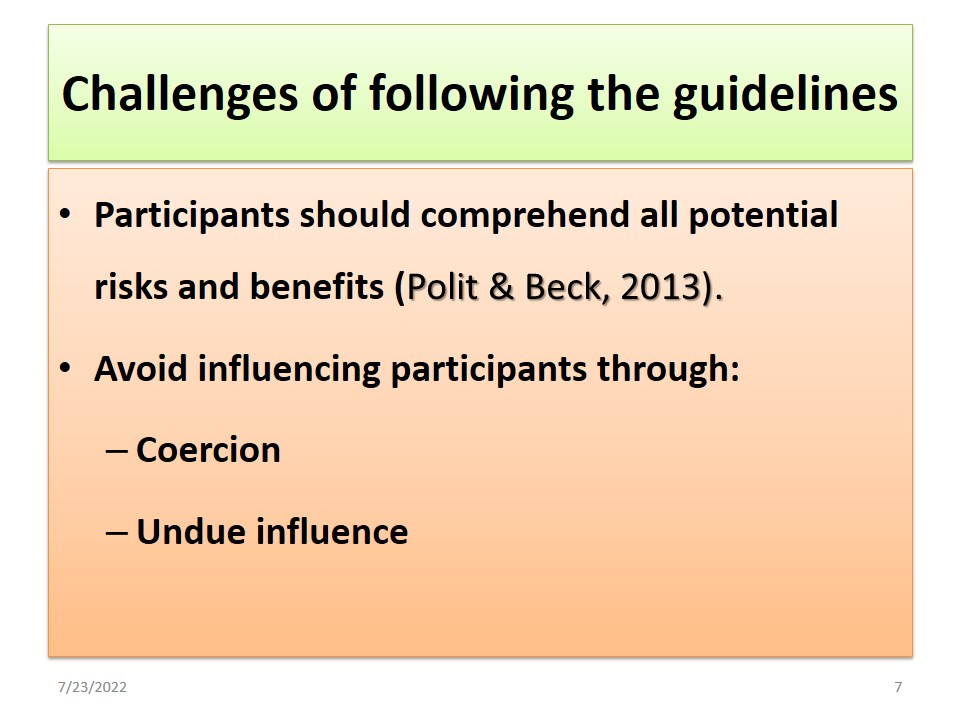
Informed consent
- All participants must offer consent voluntarily.
- Informed consent depends on:
- Whether it was voluntary;
- The participant’s comprehension (Polit & Beck, 2008).
- Disclosure:
- Language used should be easy to understand,
- Content should be easy to comprehend.
Voluntariness
Voluntary consent means that a person’s decision regarding participation in research was free of any external influence. The decision should not come from the influence of any person or factor involved in the research. Consent will only be accepted as voluntarily given when it is free of any coercion and undue influence, and when it is freely sought and given.
Comprehension
Participants need the mental and decisional capacity to allow them understand any information that they receive form the researchers. The researchers rely on the ability of the participants to make informed decisions and comply with the research requirements of comprehending facts. Comprehension facilitates voluntary consent.
Disclosure
Under disclosure, the researcher must inform participants and the relevant authorities about the following:
- The purpose of the study.
- Reasonable risks to the individual.
- Potential benefits to the individual.
- Alternative to the research procedure.
- The threshold of confidentiality protection for the participants.
- Any compensation that participants may get if there is injury due to the research procedure.
- Any identification and contact information that would be used for the study, for participants’ rights, and for dealing with injury cases.
- The conditions for participation, such as the option to withdraw from participation without being penalized.
Informed consent presentation
Researchers present information to facilitate informed consent through:
- Oral presentations allowing discussions and questions.
- Provision of additional educational materials.
- Use of video presentations and allowing feedback inquiries:
- One important consideration is that the participants MUST understand the consent process.
- It is important for the researchers to document informed consent in a written format and have the form signed by the participants or their legal representatives.
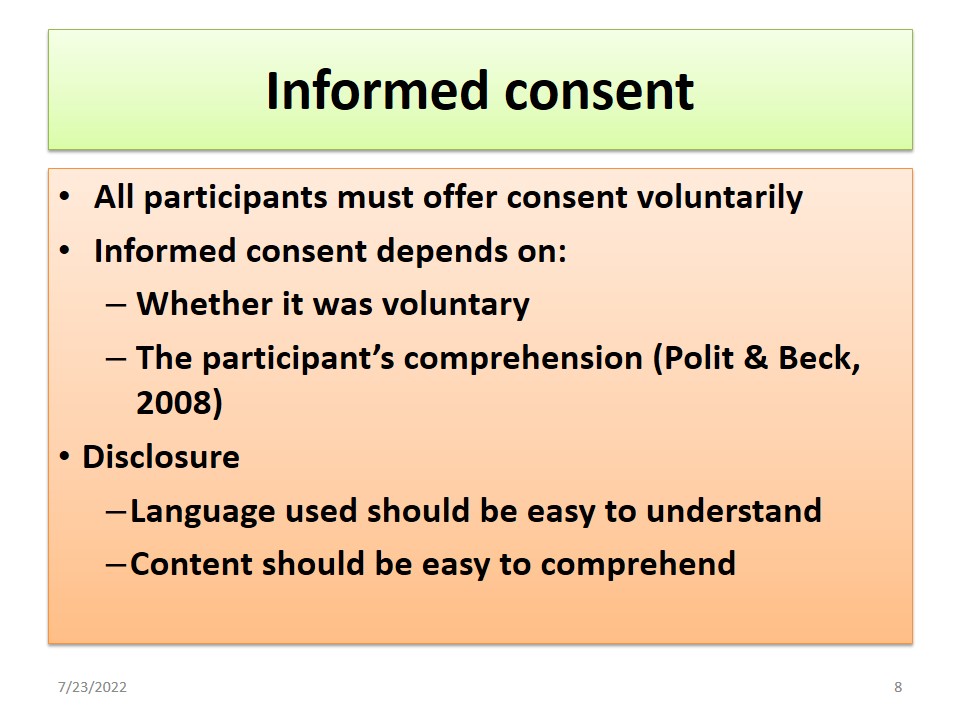
References
Finkelman, A., & Kenner, C. (2010). Professional nursing concepts: competencies for quality leadership. Sudbury, MA: Jones and Bartlett Publishers.
Polit, D., & Beck, C. (2008). Nursing research: generating and assessing evidence for nursing practice (8th ed.). Philadelphia, PA: Wolters Kluwer Health/Lippincott Williams & Wilkins.
Polit, D. F., & Beck, C. T. (2013). Essentials of nursing research: Appraising evidence for research (8th ed.). Philadelphia, PA: Wolters Kluwer Health/Lippincott Williams & Wilkins.